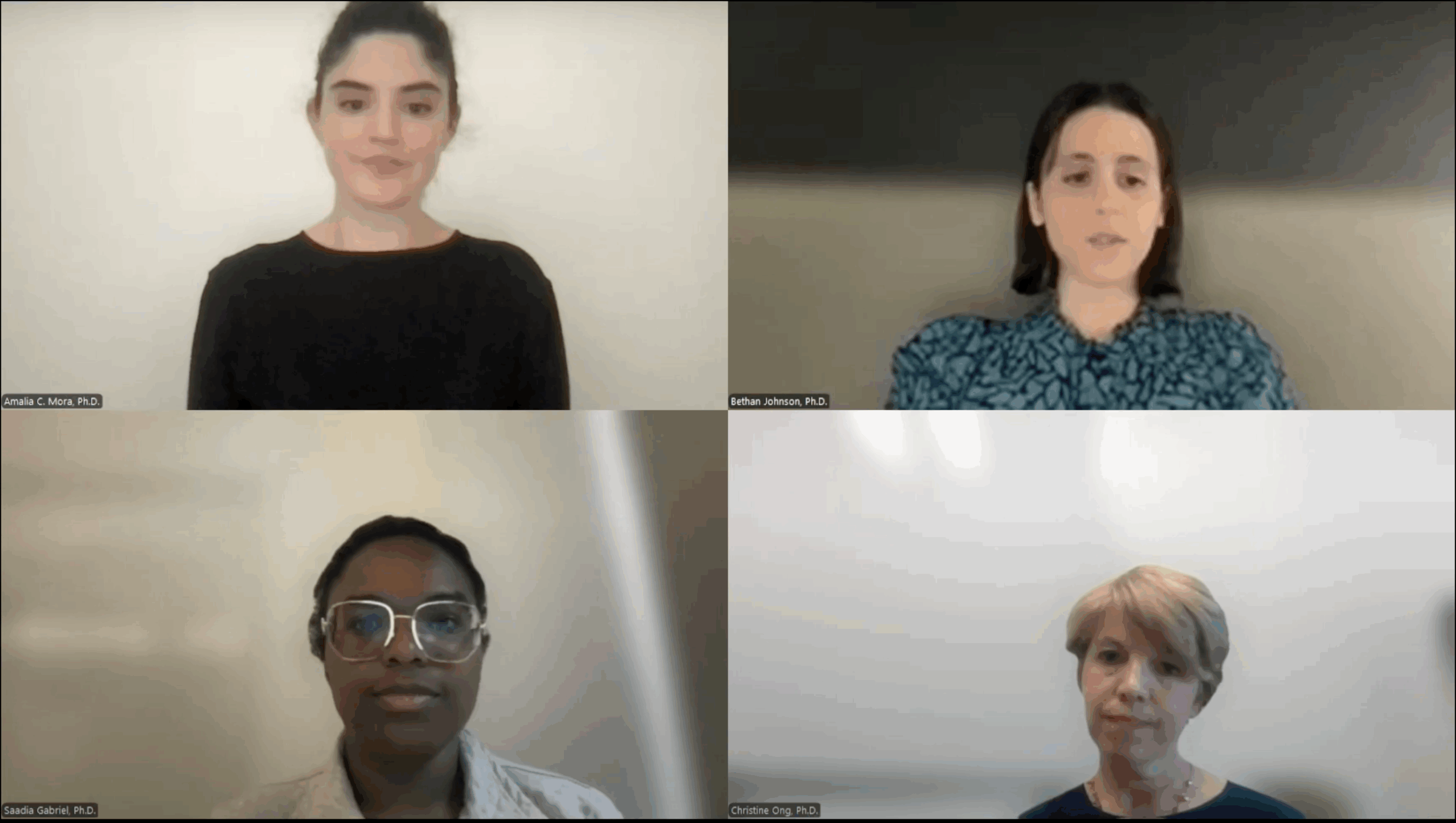Women and Philanthropy at UCLA Hosts Webinar Featuring ISH Researchers

On April 30, Women & Philanthropy at UCLA hosted ISH researchers Bethan Johnson, Saadia Gabriel, and Christine Ong for a dynamic and timely webinar on “Understanding and Mitigating Hate” moderated by ISH’s Research Manager, Amalia Mora. Women & Philanthropy President, Judith Angel kicked off the event by giving a brief introduction to the organization, which includes over 3100 members of UCLA women alumni, and gave a warm welcome to the Initiative to Study Hate team.
Dr. Mora, who is also an ethnomusicologist and professor of human rights and gendered violence at the University of Arizona, began the discussion by asking each panelist to give an overview of their scholarly background and introduce their current ISH project. Historian, legal consultant, and postdoctoral fellow Dr. Bethan Johnson did so first, describing her work studying contemporary hate groups and movements in the Anglophone world. She is also working with ISH director Professor David Myers to publish an accessible overview of how hate has been defined, manifested, and evolved in the West.
Saadia Gabriel, Assistant Professor of Computer Science at UCLA, ISH fellow, and affiliate of the Bunche Center for African American Studies, took the mic next. Dr. Gabriel has already contributed groundbreaking research on the use of AI to combat digital hate through content moderation. Her current ISH-funded project, she noted, seeks to create more diversified, and therefore more effective, data inputs that will help AI moderators construct robust algorithms that can distinguish between how certain terms are used within a given minority community and how those same terms are wielded by hate-motivated speakers to foment malice against the community in question.
Finally, Christine Ong, senior researcher at CRESST and ISH fellow with the Social Media and the Spread of Hate (SMASH) team, highlighted SMASH’s programming work with local schools to educate children and adolescents about recognizing and dealing with digital hate speech and cyberbullying while also collecting data that helps us understand just how widespread the problem of online hate is.
After these introductions, Dr. Mora prompted the panelists to take on some of the most urgent social issues we face, with a particular focus on digital hate directed at women and girls. All three scholars noted that misogyny is very often a sort of “gateway prejudice” for young men in the process of being radicalized online. Dr. Johnson pointed out that, alongside antisemitism, misogyny is the common thread connecting a variety of hateful ideologies, with Dr. Ong adding that because women make up more than half the population, it is very easy for men to find a convenient object for their resentment. Dr. Gabriel further explained that, like hate speech directed at racial out-groups, AI moderators are often unable to recognize anti-woman rhetoric because women are underrepresented throughout the process of building and training them.
At the same time, Dr. Johnson reminded the audience, it is important not to let presentism distort our understanding of these patterns. Despite the importance of quantifying, analyzing, and mitigating hate on the internet, hate groups have been targeting and radicalizing young men in similar ways throughout history. Nationalist and proto-fascist groups are also pursuing the same goals as their antecedents, in particular creating enough chaos, polarization, and hostility to make liberal democracy seem untenable. What is indeed changing, however, is the growing presence of ethnic minorities in these organizations, a process spurred on by the anonymity of digital spaces.
Another danger that is undoubtedly heightened by social media is that children and teens are becoming desensitized to hate speech and cyberbullying. Drawing on her work with SMASH, Dr. Ong noted that, though K-12 students are reporting that they encounter these issues on a regular basis, they are increasingly describing themselves as having no emotional response to them. As Dr. Gabriel explained, this points to the pressing need for more sophisticated content moderation, which can only be produced with input from a diverse team and more comprehensive data sets.
To round out the discussion, each panelist reflected on what gives them hope and what actions we can take in the present to improve the future. Dr. Mora, for example, noted the increasing presence and enthusiasm of male students in her courses on misogyny and violence against women. Dr. Ong emphasized the importance of modeling information literacy and responsible internet use for our children and peers, while Dr. Gabriel added that increased public pressure on companies to actively moderate content and diversify their teams has already had and continues to have a noticeable effect even in this moment of anti-“DEI” fervor. Although the rising tide of hate may seem overwhelming, these scholars remind us, we are not powerless to fight against it.
